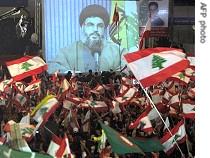2006年VOA标准英语-Hezbollah Chief Vows Lebanon Protests Will Cont(在线收听)
By Challiss McDonough
Beirut
07 December 2006
The leader of Hezbollah has vowed that protests in central Beirut will continue until the government changes to give the opposition a greater voice. He urged his followers to come back into the streets to increase the pressure on the prime minister. But Hassan Nasrallah also left open the possibility that negotiations could end the crisis, and he ruled out the use of force. VOA Correspondent Challiss McDonough has more from Beirut.

Hezbollah leader Hassan Nasrallah addresses supporters on giant screen in downtown Beirut 7 Dec 06
Speaking to the rapturous crowd of protesters from an undisclosed location via two giant video screens, Hezbollah leader Hassan Nasrallah vowed that the opposition protesters will not leave the streets of central Beirut until they have achieved their goal - a national unity government that gives the opposition one-third of the votes, and a veto over government decisions.
But he also said Hezbollah would never use its weapons to fight other Lebanese. "We reject civil war. We reject sectarian strife. Everyone loses in a civil war. We all lose," he said.
He repeatedly invoked the name of Ahmed Mahmoud, the opposition supporter who was shot to death during a clash between Sunnis and Shiites on Sunday. He said if a thousand protesters were killed, it would still not chase the protesters from the streets.
Earlier, still hold up in his office, Prime Minister Fouad Siniora had called for dialogue to find a way out of the crisis.
He said, we are sticking to our principles, and we are steadfast, but at the same time we are calling for dialogue and will continue to reach out to them. This is not weakness, it is part of our belief in unity for all Lebanese.
Nasrallah appeared to answer the prime minister's call with his own offer to negotiate. "The doors of dialogue are open." But he added, "We do not need to waste time in returning to the negotiating table. We will not leave the streets and go to the negotiating table to be deceived again."
In a fiery hour-long speech, Nasrallah shouted angrily into the microphone, waving his hands in the air and shaking his finger at the camera as he delivered broadside after broadside aimed at the Lebanese government and its American allies.
Every time he mentioned the Lebanese prime minister, he drew loud boos from the crowd. The boos and jeers grew even louder when he lambasted U.S. President George Bush, Vice President Dick Cheney, Secretary of State Condoleeza Rice and outgoing U.S. Ambassador to the United Nations John Bolton, all of whom he mentioned by name.
Nasrallah called on his followers to turn out for an even more massive protest on Sunday. But the opposition has already started working on other strategies to bring down the government, since the street protests do not appear to be working.
Political analyst Amal Saad-Ghorayeb, a visiting fellow at the Carnegie Endowment for International Peace, and noted expert on Hezbollah said "Given that there are other venues open to the opposition, such as perhaps workers strikes, resignations from public posts, which could eventually lead to resignations from the parliament. So there are sort of moderate measures and extreme measures which have yet to be taken, and in that sense, we've got to see these popular protests as the backdrop against which more drastic moves will be taken in the short to medium term."
The protests have been going on since last Friday, when an estimated 800,000 people took to the streets in support of the opposition's call for a new unity government. The ongoing demonstrations have dwindled to a few thousand who remain camped in tents outside the prime minister's office, paralyzing downtown Beirut, but their numbers swell for a few hours every night as other opposition supporters flock back to the protest site for speeches in the evenings.